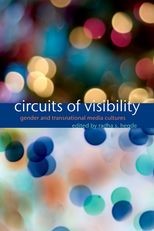 Circuits of Visibility: Gender and Transnational Media Cultures
Circuits of Visibility: Gender and Transnational Media Cultures
Contents
-
-
-
-
-
-
-
-
-
-
-
-
The Transnationalization of Local Protests The Transnationalization of Local Protests
-
Human Rights Discourses Human Rights Discourses
-
Shooting with a Camera, Shooting with a Gun Shooting with a Camera, Shooting with a Gun
-
Envisioning a Closed Society Envisioning a Closed Society
-
Conclusion Conclusion
-
Notes Notes
-
-
-
-
-
-
-
13 Digital Cosmopolitanisms: The Gendered Visual Culture of Human Rights Activism
Get access-
Published:July 2011
Cite
Abstract
This chapter explores how visual documentation of civil crises in the Global South reinscribe a digital colonialism, focusing on the representations of gender and sexuality in videos about the Oaxaca teachers' strike of 2006 and the Myanmar protests of 2007. In the first decade of the twenty-first century, the Internet has become the preeminent medium from which international human rights campaigns have been publicized. Indeed, many human rights organizations now consider the Internet as the primary venue for exposing human rights abuses and mobilizing public opinion against them. Digital media generate among viewers the capacity for flexible attachments to more than one community. They facilitate a cosmopolitanism that asserts and abstracts “universalism” and a form of activism, which corresponds with key principles of neoliberal capitalism.
Sign in
Personal account
- Sign in with email/username & password
- Get email alerts
- Save searches
- Purchase content
- Activate your purchase/trial code
- Add your ORCID iD
Purchase
Our books are available by subscription or purchase to libraries and institutions.
Purchasing information| Month: | Total Views: |
|---|---|
| August 2024 | 1 |



Get help with access
Institutional access
Access to content on Oxford Academic is often provided through institutional subscriptions and purchases. If you are a member of an institution with an active account, you may be able to access content in one of the following ways:
IP based access
Typically, access is provided across an institutional network to a range of IP addresses. This authentication occurs automatically, and it is not possible to sign out of an IP authenticated account.
Sign in through your institution
Choose this option to get remote access when outside your institution. Shibboleth/Open Athens technology is used to provide single sign-on between your institution’s website and Oxford Academic.
If your institution is not listed or you cannot sign in to your institution’s website, please contact your librarian or administrator.
Sign in with a library card
Enter your library card number to sign in. If you cannot sign in, please contact your librarian.
Society Members
Society member access to a journal is achieved in one of the following ways:
Sign in through society site
Many societies offer single sign-on between the society website and Oxford Academic. If you see ‘Sign in through society site’ in the sign in pane within a journal:
If you do not have a society account or have forgotten your username or password, please contact your society.
Sign in using a personal account
Some societies use Oxford Academic personal accounts to provide access to their members. See below.
Personal account
A personal account can be used to get email alerts, save searches, purchase content, and activate subscriptions.
Some societies use Oxford Academic personal accounts to provide access to their members.
Viewing your signed in accounts
Click the account icon in the top right to:
Signed in but can't access content
Oxford Academic is home to a wide variety of products. The institutional subscription may not cover the content that you are trying to access. If you believe you should have access to that content, please contact your librarian.
Institutional account management
For librarians and administrators, your personal account also provides access to institutional account management. Here you will find options to view and activate subscriptions, manage institutional settings and access options, access usage statistics, and more.